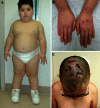Prader-Willi syndrome: a review of clinical, genetic, and endocrine findings
- PMID: 26062517
- PMCID: PMC4630255
- DOI: 10.1007/s40618-015-0312-9
Prader-Willi syndrome: a review of clinical, genetic, and endocrine findings
Abstract
Introduction: Prader-Willi syndrome (PWS) is a multisystemic complex genetic disorder caused by lack of expression of genes on the paternally inherited chromosome 15q11.2-q13 region. There are three main genetic subtypes in PWS: paternal 15q11-q13 deletion (65-75 % of cases), maternal uniparental disomy 15 (20-30 % of cases), and imprinting defect (1-3 %). DNA methylation analysis is the only technique that will diagnose PWS in all three molecular genetic classes and differentiate PWS from Angelman syndrome. Clinical manifestations change with age with hypotonia and a poor suck resulting in failure to thrive during infancy. As the individual ages, other features such as short stature, food seeking with excessive weight gain, developmental delay, cognitive disability and behavioral problems become evident. The phenotype is likely due to hypothalamic dysfunction, which is responsible for hyperphagia, temperature instability, high pain threshold, hypersomnia and multiple endocrine abnormalities including growth hormone and thyroid-stimulating hormone deficiencies, hypogonadism and central adrenal insufficiency. Obesity and its complications are the major causes of morbidity and mortality in PWS.
Methods: An extensive review of the literature was performed and interpreted within the context of clinical practice and frequently asked questions from referring physicians and families to include the current status of the cause and diagnosis of the clinical, genetics and endocrine findings in PWS.
Conclusions: Updated information regarding the early diagnosis and management of individuals with Prader-Willi syndrome is important for all physicians and will be helpful in anticipating and managing or modifying complications associated with this rare obesity-related disorder.
Keywords: Chromosome 15 abnormalities; Endocrine disturbances; Genomic imprinting; Hypogonadism; Obesity; Prader-Willi syndrome; Short stature.
Figures


Similar articles
-
Hypogonadism in Patients with Prader Willi Syndrome: A Narrative Review.Int J Mol Sci. 2021 Feb 17;22(4):1993. doi: 10.3390/ijms22041993. Int J Mol Sci. 2021. PMID: 33671467 Free PMC article. Review.
-
The changing purpose of Prader-Willi syndrome clinical diagnostic criteria and proposed revised criteria.Pediatrics. 2001 Nov;108(5):E92. doi: 10.1542/peds.108.5.e92. Pediatrics. 2001. PMID: 11694676
-
Prader-Willi Syndrome: Clinical Genetics and Diagnostic Aspects with Treatment Approaches.Curr Pediatr Rev. 2016;12(2):136-66. doi: 10.2174/1573396312666151123115250. Curr Pediatr Rev. 2016. PMID: 26592417 Free PMC article. Review.
-
Obesity in Prader-Willi syndrome: physiopathological mechanisms, nutritional and pharmacological approaches.J Endocrinol Invest. 2021 Oct;44(10):2057-2070. doi: 10.1007/s40618-021-01574-9. Epub 2021 Apr 23. J Endocrinol Invest. 2021. PMID: 33891302 Free PMC article. Review.
-
Prader-Willi Syndrome - Clinical Genetics, Diagnosis and Treatment Approaches: An Update.Curr Pediatr Rev. 2019;15(4):207-244. doi: 10.2174/1573396315666190716120925. Curr Pediatr Rev. 2019. PMID: 31333129 Free PMC article. Review.
Cited by
-
Hypogonadism in Patients with Prader Willi Syndrome: A Narrative Review.Int J Mol Sci. 2021 Feb 17;22(4):1993. doi: 10.3390/ijms22041993. Int J Mol Sci. 2021. PMID: 33671467 Free PMC article. Review.
-
Single Gene and Syndromic Causes of Obesity: Illustrative Examples.Prog Mol Biol Transl Sci. 2016;140:1-45. doi: 10.1016/bs.pmbts.2015.12.003. Epub 2016 Mar 23. Prog Mol Biol Transl Sci. 2016. PMID: 27288824 Free PMC article. Review.
-
Prader-Willi syndrome, deletion subtypes, and magnesium: Potential impact on clinical findings.Am J Med Genet A. 2022 Nov;188(11):3278-3286. doi: 10.1002/ajmg.a.62928. Epub 2022 Aug 6. Am J Med Genet A. 2022. PMID: 36190479 Free PMC article.
-
Assessment of Binge-Like Eating of Unsweetened vs. Sweetened Chow Pellets in BALB/c Substrains.Front Behav Neurosci. 2022 Jul 15;16:944890. doi: 10.3389/fnbeh.2022.944890. eCollection 2022. Front Behav Neurosci. 2022. PMID: 35910681 Free PMC article.
-
The Italian registry for patients with Prader-Willi syndrome.Orphanet J Rare Dis. 2023 Feb 15;18(1):28. doi: 10.1186/s13023-023-02633-5. Orphanet J Rare Dis. 2023. PMID: 36793093 Free PMC article.
References
-
- Prader A, Labhart A, Willi H. Ein Syndrom von Adipositas, Kleinwuchs, Kryptorchismus und Oligophrenie nach myatonieartigem Zustand im neugeborenenalter. Schweiz Med Wochenschr. 1956;86:1260–1261.
-
- Butler MG, Lee PDK, Whitman BY. Management of Prader-Willi Syndrome. New York: Springer; 2006.
Publication types
MeSH terms
LinkOut - more resources
Full Text Sources
Other Literature Sources
Medical
Research Materials

